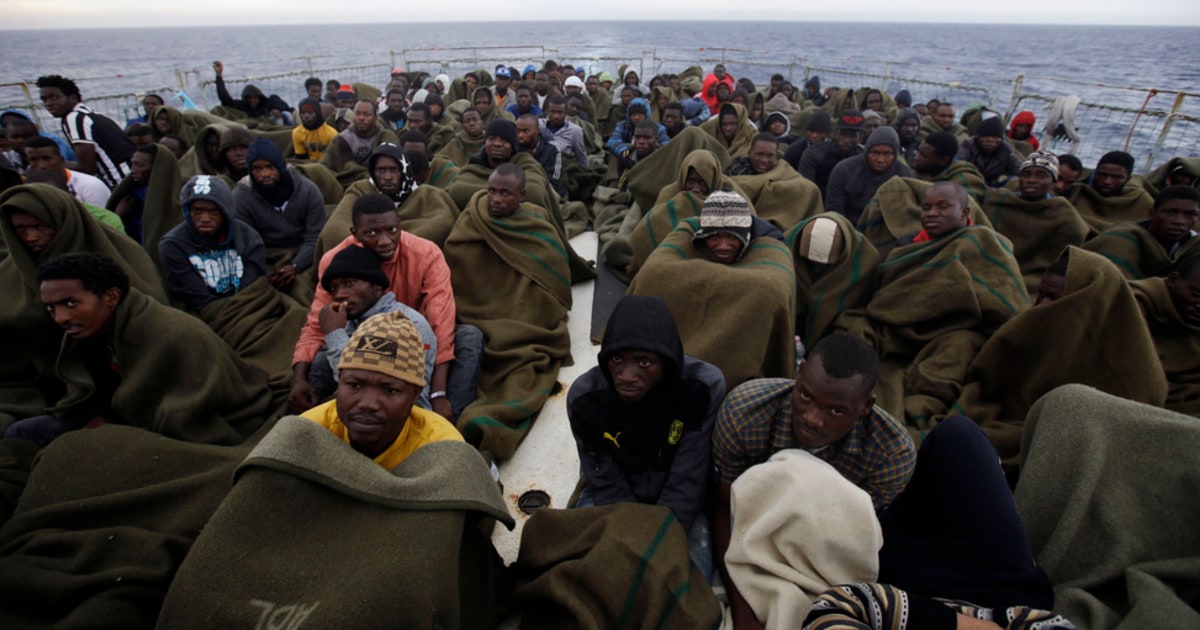Enlarge image
People wait for food in a makeshift refugee camp in northern Ethiopia
Photo: Amanuel Sileshi / AFP
These are just the numbers from last year, i.e. before the Ukraine war.
And yet they are alarming.
At the end of 2021, 89.3 million people were displaced by war, persecution and human rights abuses.
That is eight percent more than the year before - and more than twice as many as ten years ago.
This emerges from the latest report by the UN refugee agency UNHCR, which was available to SPIEGEL in advance.
The organization had already reported record numbers in recent years.
Now they are likely to rise again.
As early as May, the organization reported that the number of people fleeing the world had risen to more than a hundred million for the first time this year.
The number of internally displaced persons in Afghanistan has been increasing for 15 years
According to the current annual report, 31.5 million people left their home countries by December 2021.
Most come from these five countries:
In addition, there were 4.6 million asylum seekers and 53.2 million internally displaced persons who had to flee within their own country, at least temporarily.
In Afghanistan, for example, there were 900,000 people in the year the Taliban took power again.
As frightening as the number is: According to the UN, last year was the fifteenth in a row in which the number of internally displaced persons rose again.
In Yemen and in Asian countries such as Myanmar, as well as in African countries such as Burkina Faso, Ethiopia and South Sudan, large numbers of people again fled within the borders of their countries.
According to the authors of the report, the causes included not only military conflicts and displacement, but also the consequences of climate change.
More and more people are fleeing Venezuela
The number of people from Venezuela who left their country as refugees, asylum seekers or migrants is now also shown separately.
By the end of 2021, the UN named 4.6 million people who left the country, which was marked by economic difficulties, corruption and mismanagement.
Overall, the UNHCR draws a sobering conclusion in its report.
"For the past decade, the number of displaced people has increased every year," said United Nations High Commissioner for Refugees Filippo Grandi.
"If the international community does not come together to do something about this human tragedy, to end conflicts and find lasting solutions, then this terrible trend will continue."
Along with Turkey, Uganda and Pakistan, Germany is one of the five countries in which the most refugees found refuge worldwide by the end of 2021.
Colombia has a special status.
The South American country granted protection to 1.8 million people, most of whom came from neighboring Venezuela, but are not only counted as refugees.
Counting is not undisputed
In general, the UNHCR annual report once again describes very different fates.
The UN refugee agency also counts among the displaced people Palestinians who found refuge in neighboring countries such as Jordan or Lebanon decades ago and some of whom have long had new citizenship today.
Refugees who have a permanent residence permit in Europe, for example, are also included in the count.
"Unfortunately, the way the UNHCR talks about refugee numbers also plays into the hands of those who warn of non-existent mass migrations," migration expert Gerald Knaus criticized the UN counting method last year.
The UN also admits that the current report does not fully reflect the actual situation, but mainly because of the lack of data since the beginning of the year.
"Since then, the Russian invasion of Ukraine has triggered one of the largest and fastest growing displacement crises since World War II," the UNHCR said on the occasion of today's publication.
Unequal burdens for poorer and richer countries
The aid organization is already assuming that the Russian war of aggression against Ukraine will cause the record numbers to continue to rise.
At the same time, the people who fled from Ukraine to Europe are an exception from a global perspective.
According to the report, 83 percent of refugees and displaced persons worldwide found refuge in low- and middle-income countries, mostly in neighboring countries.
The different ways in which refugees and migrants are treated have recently also been addressed by other aid organizations.
“Those fleeing violence and those seeking protection should be treated equally,” demanded the President of the International Red Cross, Francesco Rocca, who at a recent press conference accused the Europeans of treating Ukrainian and African refugees unequally: “Yes, there is a double standard.”
The British plans to deport asylum seekers to Rwanda, for example, are currently showing that migration policy remains an issue of conflict.
The European Court of Human Rights banned the project on Tuesday, but Great Britain is sticking to its plans.
Despite such conflicts and ongoing crises, the UNHCR also sees signs of improvement in its annual report – at least on a small scale.
Because although the number of stateless people increased slightly last year, around 81,000 people also acquired citizenship or had it confirmed.
According to the United Nations refugee agency, this is the highest number since 2014.
This contribution is part of the Global Society project
Expand areaWhat is the Global Society project?
Under the title »Global Society«, reporters from
Asia, Africa, Latin America and Europe
report on injustices in a globalized world, socio-political challenges and sustainable development.
The reports, analyses, photo series, videos and podcasts appear in a separate section in the foreign section of SPIEGEL.
The project is long-term and is supported by the Bill & Melinda Gates Foundation (BMGF).
A detailed FAQ with questions and answers about the project can be found here.
AreaWhat does the funding look like in concrete terms?open
The Bill & Melinda Gates Foundation (BMGF) has been supporting the project since 2019 for an initial three years with a total of around 2.3 million euros - around 760,000 euros per year.
In 2021, the project was extended by almost three and a half years until spring 2025 under the same conditions.
AreaIs the journalistic content independent of the foundation?open
Yes.
The editorial content is created without the influence of the Gates Foundation.
AreaDo other media also have similar projects?open
Yes.
With the support of the Gates Foundation, major European media outlets such as The Guardian and El País have set up similar sections on their news sites with Global Development and Planeta Futuro respectively.
Did SPIEGEL already have similar projects? open
In recent years, SPIEGEL has already implemented two projects with the European Journalism Center (EJC) and the support of the Bill & Melinda Gates Foundation: the "OverMorgen Expedition" on global sustainability goals and the journalistic refugee project "The New Arrivals ", within the framework of which several award-winning multimedia reports on the topics of migration and flight have been created.
Expand areaWhere can I find all publications on the Global Society?
The pieces can be found at SPIEGEL on the Global Society topic page.









